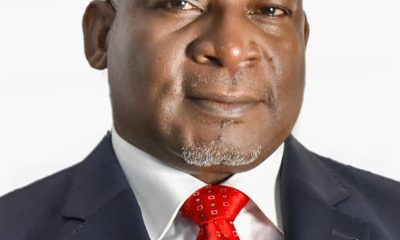Business News
Why Nigeria Didn’t Sign OECD Minimum Corporate Tax Agreement — FIRS

By Tony Obiechina, Abuja
The Federal Inland Revenue Service (FIRS) has explained why Nigeria did not sign the Organisation for Economic Cooperation and Development (OECD) G20 Inclusive Framework two-pillar solution to tax challenges of the digitalized economy. The OECD G20 Inclusive Framework two-pillar solution proposes a framework of rules aimed at tackling base erosion and profit shifting, and providing for the taxation of Multinational Enterprises (MNEs).
He explained that the webinar was therefore to educate the general public on the modalities and impact of the statement released by the OECD Inclusive Framework on the 8th of October 2021 and to provide a broad picture on why Nigeria abstained from signing. The webinar which was a special edition of the FIRS Taxpayer Engagement Series was hosted by Mr. Olufemi Olarinde, Technical Assistant (Tax Policy) to the Executive Chairman FIRS, while technical papers where delivered by Mr. Mathew Gbonjubola, Mr. Temitayo Orebajo, Mr. Kehinde Kajesomo, Mr, Emmanuel Eze and Ms. Aisha Isa, all staff of the FIRS. Explaining in details, Mr. Mathew Gbonjubola, the Group Lead Special Tax Operations Group, and Nigeria’s representative at the OECD Inclusive Framework highlighted that despite the expected outcome that both Pillars will increase Global Corporate Income Tax by as much as $150 Billion per annum, with attendant favourable environment for investment and economic growth, there were serious concerns that the pillars did not address negative revenue outcome for Nigeria and other developing countries. “The general issues that developing countries have with the outcome that was published in October 8th is the high cost of implementation. And that speaks to the complexities of the proposal in the inclusive framework statement. In every complex situation or rule, implementation and compliance will always be difficult. When implementation or compliance is difficult, there would be high cost of implementation. “Another issue was that the economic impact assessment that was carried out on Pillar 1 and 2 were founded on an unreliable premise. The country-specific impact assessment that was done was top-down. Somebody just looked at the GDP of Nigeria, and says Nigeria’s GDP is this much and then they should be able to buy this number of shoes and things like that. And you and I know, in that kind of postulation, the margin of error is usually very wide. That exactly was what happened with this. Particularly for Nigeria, when we ran the numbers it was way off the figures that the OECD gave us. “And the final issue most developing countries had was that the developed world, within the inclusive framework, was very indifferent to the concerns expressed by most developing countries. This you can see from the outcome, with respect to the complexity, issues of high cost of implementation and on the issue of revenue accruable to developing countries. When you look at the bulk of the money that would accrue from the project, if any, 70% – 80% will go to the developed countries. Almost nothing comes to the developing countries.” He explained. On the specific concerns raised by Nigeria, Mr. Gbonjubola, who led Nigeria’s team on the Inclusive Framework negotiations, explained that while the whole project started out to find solutions to the challenges of a digitalised economy the outcome was completely different. He went further to note that the statement by the OECD Inclusive Framework required all parties to remove all Digital Service Taxes and other relevant similar measures with respect to companies taxation and to commit not to introduce such measures in the future. “The statement required the withdrawal of unilateral measures by countries. Which Nigeria does not have a problem with (Nigeria does not have any unilateral measure targeted at digital services companies). However, the paper that was released on unilateral measures was so expansive in its definition that we are concerned that the taxing rights that Nigeria has always enjoyed may be withdrawn.” He further explained that Nigeria is unable to implement the mandatory binding resolution on arbitration because of constitutional limitations as to tax dispute resolution. He also stated that for Nigeria, “Pillar 2 is not a deal breaker because Nigeria could work with Pillar 2. “We have a few issues with Pillar 2 but we could live with them but because Pillar 1 and 2 are a single package, since we are rejecting Pillar 1, we can’t take on Pillar 2”. “Under the inclusive framework rule you either accept both Pillars or you reject both Pillars. You cannot pick one to the exclusion of the other. And since Nigeria is not able to join one of the pillars, it means we are out of both Pillars.” Mr. Gbonjubola also stated that Nigeria does not see any additional revenue coming to by way of Pillar 2, though he added that it could act as a behaviour modifier for policy makers to take another look at the various tax incentives and tax waivers we have in our tax laws and begin to restructure them in other to ensure that we are not deliberately throwing away revenue. “Nigeria could not sign up to the statement of the inclusive framework because it did not address the concerns that we had expressed as a country and it also did not take cognisance of issues around developing countries, which will make those outcomes not to provide additional revenue, and if any, very little, and at very significant cost.” He further stated that Nigeria, which had participated in all the meetings of the working groups would continue to participate in the design of all technical notes and model rules, and would agree to the Pillars if its expressed concerns are addressed. “And finally, just like the Honourable Minister of Finance said a couple of months ago, Nigeria would continue to participate in the inclusive framework activities particularly the design of all the technical notes and the model rules, and then, if and only if, the concerns we have expressed are addressed, then Nigeria still has the chance to join up and to sign up. But if not, we will leave that to our policy makers to decide going forward” The Webinar had in attendance Prof. Abiola Sani, a professor of Commercial Law in Nigeria as well as other eminent tax practitioners and representatives of government and private institutions. The representatives of the Kenya and Zambia revenue authorities were also in attendance.
Business News
Tinubu Congratulates Dangote on World Bank Appointment

By Jennifer Enuma, Abuja
President Bola Tinubu has congratulated Alhaji Aliko Dangote, the President of Dangote Group, on his appointment to the World Bank’s Private Sector Investment Lab, a body tasked with promoting investment and job creation in emerging economies.
In a statement by Special Adviser on Media and Publicity, Bayo Onanauga, the President described the appointment as apt, given Dangote’s rich private sector experience, strategic investments, and many employment opportunities created through his Dangote Group.
The Dangote Group became one of Africa’s leading conglomerates through innovation and continuous investment.
Dangote Group’s business interests span cement, fertiliser, salt, sugar, oil, and gas. However, the $20 billion Dangote Petroleum Refinery and Petrochemicals remains Africa’s most daring project and most significant single private investment.
“President Tinubu urges Dangote to bring to bear on the World Bank appointment his transformative ideas and initiatives to impact the emerging markets across the world fully” the statement said.

The World Bank announced Dangote’s appointment on Wednesday, as part of a broader expansion of its Private Sector Investment Lab. The lab now enters a new phase aimed at scaling up solutions to attract private capital and create jobs in the developing world.
The CEO of Bayer AG, Bill Anderson, the Chair of Bharti Enterprises, Sunil Bharti Mittal, and the President and CEO of Hyatt Hotels Corporation, Mark Hoplamazian, are on the Private Sector Investment Lab with Dangote.
The World Bank said the expanded membership brings together business leaders with proven track records in generating employment in developing economies, supporting the Bank’s focus on job creation as a central pillar of global development.
Business Analysis
Nigeria Customs Generates over N1.75trn Revenue in 2025
By Joel Oladele, Abuja
The Nigeria Customs Service (NSC) has generated an impressive N1,751,502,252,298.05 in revenue during the first quarter of 2025.
The Comptroller-General (CG) of the Service, Bashir Adeniyi, disclosed this yesterday, during a press briefing in Abuja.
According to Adeniyi, the achievement not only surpasses the quarterly target but also marks a substantial increase compared to the same period last year, reflecting the effectiveness of recent reforms and the dedication of customs officers across the nation.
“This first quarter of 2025 has seen our officers working tirelessly at borders and ports across the nation.
I’m proud to report we’ve made real progress on multiple fronts—from increasing revenue collections to intercepting dangerous shipments,” Adeniyi stated.He attributed this success to the reforms initiated under President Bola Tinubu’s administration and the guidance of the Honourable Minister of Finance and Coordinating Minister of the Economy, Olawale Edun.
The CG noted that the revenue collection for Q1 2025 exceeded the quarterly benchmark of N1,645,000,000,000.00 by N106.5 billion, achieving 106.47% of the target. This performance represents a remarkable 29.96% increase compared to the N1,347,705,251,658.31 collected in Q1 2024.
Adeniyi highlighted the month-by-month growth, noting that January’s collection of N647,880,245,243.67 surpassed its target by 18.12%, while February and March also showed positive trends.
“I’m pleased to report the Service’s revenue collection for Q1 2025 totaled N1,751,502,252,298.05.
“Against our annual target of N6,580,000,000,000.00, the first quarter’s proportional benchmark stood at N1,645,000,000,000.00. I’m proud to announce we’ve exceeded this target by N106.5 billion, achieving 106.47% of our quarterly projection. This outstanding performance represents a substantial 29.96% increase compared to the same period in 2024, where we collected N1,347,705,251,658.31.
“Our month-by-month analysis reveals even more encouraging details of this growth trajectory,” Adeniyi said.
In addition to revenue collection, Adeniyi said the NCS maintained robust anti-smuggling operations, recording 298 seizures with a total Duty Paid Value (DPV) of ₦7,698,557,347.67.
He stated that rice was the most seized commodity, with 135,474 bags intercepted, followed by petroleum products and narcotics.
“From rice to wildlife, these seizures show our targeted approach,” Adeniyi remarked, noting the NCS’s commitment to combating smuggling and protecting national revenue.
Adeniyi also highlighted key initiatives, including the expansion of the B’Odogwu customs clearance platform and the launch of the Authorized Economic Operators Programme, which aims to streamline processes for compliant businesses. The NCS’s Corporate Social Responsibility Programme, “Customs Cares,” was also launched, focusing on education, health, and environmental sustainability.
Despite these achievements, the CG noted that the NCS faced challenges, including exchange rate volatility and non-compliance issues. Adeniyi acknowledged the need for ongoing adaptation and collaboration with stakeholders to address these challenges effectively.
Looking ahead, the NCS aims to continue its modernization efforts and enhance service delivery, ensuring that it remains a critical institution in Nigeria’s economic and security landscape.
“Results speak louder than plans; faster clearances through B’Odogwu, trusted traders in the AEO program, and measurable food price relief from our exemptions. We’ll keep scaling what works,” he concluded.
BUSINESS
NSIA Net Assets Hit N4.35trn in 2024
By Tony Obiechina Abuja
The Nigeria Sovereign Investment Authority (NSIA) yesterday disclosed that its net assets grew from N156bn in 2013 to N4.35 trillion in 2024.
Similarly, the Authority has remained profitable for 12 consecutive years, leading to cumulative retained earnings of N3.
74 trillion in 2024.Managing Director and Chief Executive Officer of NSIA, Aminu Umar- Sadiq made these disclosures at a media engagement in Abuja, highlighting its audited financial results for the 2024 fiscal year.
According to him, the results underscored the resilience of the authority’s investment strategy and the strength of its earnings, driven by a well-diversified revenue base and robust risk management practices, despite a challenging global macroeconomic and geopolitical environment.
Total operating profits, excluding share of profits from associates and Joint Venture (JV) entities, increased from N1.17 trillion in 2023 to N1.86 trillion in 2024, driven by the strong performance of
NSIA’s diversified investment portfolio, infrastructure assets, gains from foreign exchange movements, and derivative valuations.
In addition, Total Comprehensive Income (TCI), inclusive of share of profits from associates and JV entities, reached N1.89 trillion in 2024, reflecting a 59 per cent increase from N1.18 trillion in 2023.
Core TCI (excluding foreign exchange and derivative valuation gains) rose by 148 per cent to N407.9 billion in 2024 compared to N164.7 billion in 2023, supported by robust returns on financial assets measured at fair value through profit and loss, including collateralised securities, private equity, hedge funds, and Exchange-Traded Funds (ETFs).
Umar-Sadiq said the authority’s outstanding financial performance in 2024 reflected the “strength of our strategic vision, disciplined execution and unwavering commitment to sustainable socio-economic advancement.”
He said, “By leveraging innovation, strategic partnerships and sound risk management, we have not only delivered strong returns but also created value for our stakeholders
“As we move forward, we remain focused on driving economic transformation, expanding opportunities, scaling transformative impact and ensuring long-term prosperity for current and future generations of Nigerians.”
The CEO reaffirmed the authority’s commitment to managing the country’s SWF, and delivering the mandates enshrined in the NSIA Act.
He said NSIA remained poised to continually create long-term value for its stakeholders by delivering excellent risk-adjusted financial results, developing a healthy and well-diversified portfolio of assets and large-scale infrastructure projects, and enhancing the desired social outcomes.
He noted that NSIA was committed to its mandate of prudent management and investment of Nigeria’s sovereign wealth.
“In adherence to its Establishment Act, NSIA prioritises transparency, disclosure, and effective communication with all stakeholders and counterparties,” he said.
He pointed out that in the year under review, a new board, led by Olusegun Ogunsanya as Chairman, was appointed by President Bola Tinubu, in accordance with the provisions of the NSIA Act.
The new board will provide strategic direction and oversight, in addition to playing a pivotal role in critical decision making.
He remarked that under the guidance of the Board, the Authority will retain focus on its primary mandate of creating shared value for all stakeholders based on its continued adoption of corporate governance practices.
“NSIA prides itself an investment institution of the federation established to manage funds in excess of budgeted oil revenues and its mission is to play a pivotal role in driving sustained economic development for the benefit of all Nigerians through building a savings base for the Nigerian people, enhancing the development of the county’s infrastructure, and providing stabilisation support in times of economic misadventure,” he added.
























